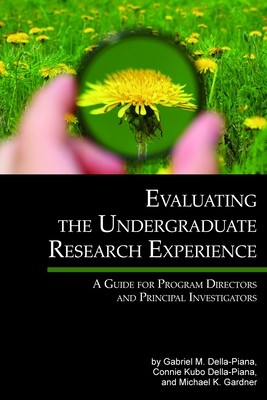
- We will send in 10–14 business days.
- Author: Gabriel M Della-Piana
- Publisher: Information Age Publishing
- ISBN-10: 1623965411
- ISBN-13: 9781623965419
- Format: 15.6 x 23.4 x 1.3 cm, softcover
- Language: English
- SAVE -10% with code: EXTRA
Evaluating the Undergraduate Research Experience (e-book) (used book) | bookbook.eu
Reviews
Description
The current movement toward more and better research experiences for undergraduates has spread across disciplines in the arts, humanities, science, mathematics, and engineering beyond the "research university" to the full range of post-secondary institutions of higher education. Along with this spread of practice is the need to take stock of the programs and make use of evaluation to inform program improvement and to communicate an understanding of the worth of the program to funders, institutional administrators, faculty/mentors, and students. The main aim of the book is to provide a practical guide for planning an evaluation of an undergraduate experience program. The intent is to enable a program director to plan with a team consisting of an internal evaluator and program staff, a systematic and rigorous study of the program (processes, products, organizational dynamics, etc.) including the gathering and analysis of information that is context-sensitive, and connected to an argument and justification for descriptive, causal, and practice-useful claims. It is useful for a program director to contract with an evaluator. It is specific to the field of undergraduate research experience while being useful for other fields. It places strong emphasis on how to find and specify evaluation questions that yield information that has high leverage for program improvement and demonstrating the effectiveness and worth of the program. A measure of attitude toward evaluation allows you to reflect on your leanings evaluation orientations such as formative/summative, process/product, preordinate goals/emergent goals, and other characteristics of approaches to and confidence in evaluation. The main readership is targeted to directors and developers of undergraduate research experience programs. While the examples are mainly in the undergraduate research experience, it will be found useful for instructors of courses in project evaluation and beginning level evaluators. The usefulness of the book is enhanced by a checklist in the final chapter that integrates the approaches from throughout the book referencing the earlier discussions.
EXTRA 10 % discount with code: EXTRA
The promotion ends in 9d.19:57:11
The discount code is valid when purchasing from 10 €. Discounts do not stack.
- Author: Gabriel M Della-Piana
- Publisher: Information Age Publishing
- ISBN-10: 1623965411
- ISBN-13: 9781623965419
- Format: 15.6 x 23.4 x 1.3 cm, softcover
- Language: English English
The current movement toward more and better research experiences for undergraduates has spread across disciplines in the arts, humanities, science, mathematics, and engineering beyond the "research university" to the full range of post-secondary institutions of higher education. Along with this spread of practice is the need to take stock of the programs and make use of evaluation to inform program improvement and to communicate an understanding of the worth of the program to funders, institutional administrators, faculty/mentors, and students. The main aim of the book is to provide a practical guide for planning an evaluation of an undergraduate experience program. The intent is to enable a program director to plan with a team consisting of an internal evaluator and program staff, a systematic and rigorous study of the program (processes, products, organizational dynamics, etc.) including the gathering and analysis of information that is context-sensitive, and connected to an argument and justification for descriptive, causal, and practice-useful claims. It is useful for a program director to contract with an evaluator. It is specific to the field of undergraduate research experience while being useful for other fields. It places strong emphasis on how to find and specify evaluation questions that yield information that has high leverage for program improvement and demonstrating the effectiveness and worth of the program. A measure of attitude toward evaluation allows you to reflect on your leanings evaluation orientations such as formative/summative, process/product, preordinate goals/emergent goals, and other characteristics of approaches to and confidence in evaluation. The main readership is targeted to directors and developers of undergraduate research experience programs. While the examples are mainly in the undergraduate research experience, it will be found useful for instructors of courses in project evaluation and beginning level evaluators. The usefulness of the book is enhanced by a checklist in the final chapter that integrates the approaches from throughout the book referencing the earlier discussions.


Reviews